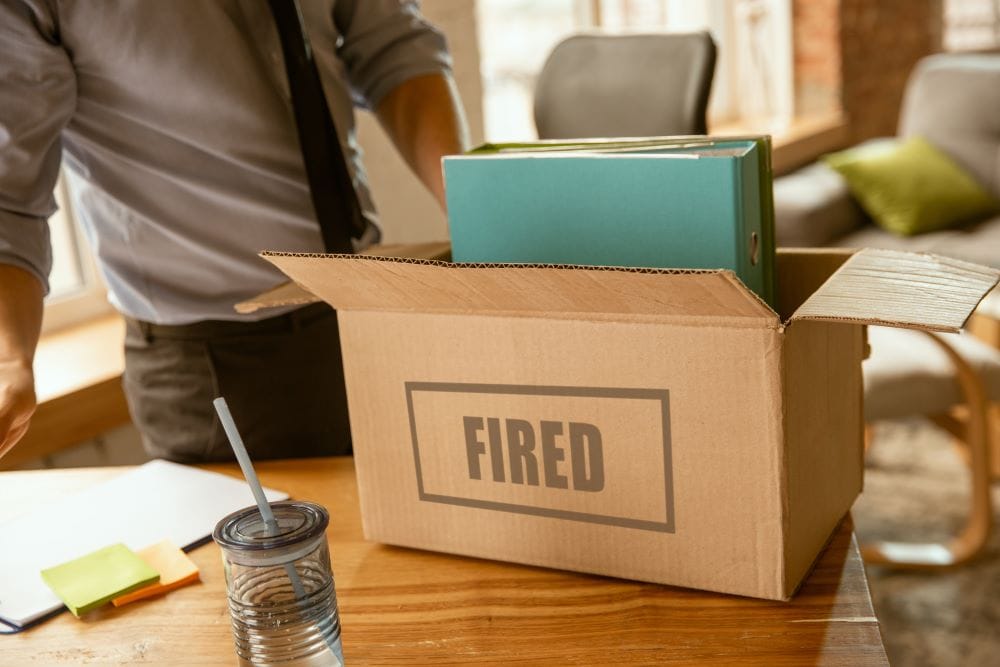
In the fast-paced and competitive job market of California, the fear of getting fired for poor performance can be daunting. Many individuals find themselves asking the crucial question: “If I get fired for poor performance, can I collect unemployment?”
In this comprehensive guide, we’ll delve into the intricacies of unemployment benefits, shedding light on how they work, who qualifies for them, and whether individuals terminated for poor performance can access these crucial benefits.
How Do Unemployment Benefits Work?
Unemployment benefits are designed to provide financial support to individuals who find themselves without a job through no fault of their own. The aim is to help them bridge the gap between jobs, ensuring they can cover essential expenses while actively seeking new employment opportunities.
In California, the Employment Development Department (EDD) oversees the administration of unemployment benefits. To qualify for these benefits, individuals must meet certain eligibility criteria, which include having earned sufficient wages in a designated “base period” and actively seeking new employment.
Who Qualifies For Unemployment Benefits?
Understanding the eligibility requirements is crucial for unemployed workers considering unemployment benefits. Generally, individuals must have lost their jobs through no fault of their own, such as layoffs or company closures. Factors like job performance and termination reasons come into play, making it essential to explore the specifics of being fired for poor performance.
Unemployment Eligibility Requirements
To be eligible for unemployment benefits in California, individuals must have:
Lost their job through no fault of their own: Layoffs, business closures, or other factors unrelated to the employee’s actions.
Earned sufficient wages in their base period: The base period is a specific timeframe used to determine eligibility based on earnings.
Continued to seek new employment: Actively looking for a new job is a requirement to receive benefits.
Length of Employment: Many states require individuals to have a certain work history or have earned a minimum amount during a designated base period.
Ability and Availability to Work: To receive unemployment benefits, individuals must demonstrate that they are able and available to work. This requirement ensures that the recipient is actively seeking new employment opportunities.
While these are general requirements, the focus shifts when considering individuals terminated for poor performance.
Can You Get Unemployment If You Were Fired for Performance Reasons?
The question of whether one can collect unemployment after being fired for poor performance is nuanced. In California, individuals terminated for poor performance may still be eligible for unemployment benefits, but certain conditions apply.
If an employer can demonstrate that the termination was a result of the employee’s willful misconduct, wanton disregard of the employer’s interests, or a breach of duty, the employee may be deemed ineligible for benefits. However, cases where the termination is due to good faith errors or factors beyond the employee’s control may still allow for eligibility.
How to Collect Unemployment If You Get Fired for Poor Performance
Navigating the process of collecting unemployment benefits after being fired for poor performance requires a strategic and informed approach. Here’s a step-by-step guide to help individuals in this situation:
Understand Termination Circumstances: Assess reasons for termination, distinguishing factors beyond control from alleged misconduct.
Gather Documentation: Collect performance reviews and relevant communication, compiling evidence supporting your case.
Review State Guidelines: Familiarize with California’s eligibility criteria and be aware of potential disqualifying factors.
File for Unemployment Benefits: Initiate a claim with the Employment Development Department (EDD), providing accurate employment history and termination details.
Prepare for EDD Interview: Anticipate potential questions about termination and clearly present your case during the interview.
Seek Legal Counsel: Consult an experienced employment lawyer to gain insights into your rights and the appeals process.
Participate in Appeals Process: Appeal promptly if the initial claim is denied and present additional evidence or arguments supporting eligibility.
Attend Hearings if Necessary: Attend any hearings related to the appeals process, clearly articulating your case and responding to questions.
Stay Informed About Your Rights: Keep abreast of your rights throughout the process, understanding the complexities of employment laws.
Consider Alternative Employment Options: Actively seek new job opportunities and demonstrate commitment to securing new employment.
Factors Affecting Unemployment Eligibility: A Comprehensive Overview
Several factors can impact an individual’s eligibility for unemployment insurance benefits when terminated for poor performance. These include:
Willful Misconduct: If the termination resulted from willful misconduct or a reckless disregard for the employer’s interests, eligibility for unemployment benefits may be compromised.
Job Performance Evaluation: The evaluation of job performance, including documented instances of poor performance, can play a crucial role in determining eligibility.
Employer’s Business Interests: Employers may argue that the termination was necessary to protect the overall interests of the business, potentially impacting the eligibility of the former employee for unemployment benefits.
Can Employers Contest an Unemployment Claim?
Yes, employers have the right to contest an unemployment claim, especially if they believe the termination was justified due to the employee’s actions. Employers may present evidence to the EDD to support their case, and the burden of proof may lie on them to demonstrate the employee’s willful misconduct or wanton disregard for the company’s interests.
What Are the Rights of Fired Employees?
Fired employees in California possess certain rights, which are crucial to understand and assert when facing termination. These rights are designed to protect employees and ensure fair treatment in the aftermath of termination. Here are key rights that fired employees should be aware of:
Final Paycheck: Employees have the right to receive their final paycheck, including accrued unused vacation days, immediately at the time of termination.
Accrued Vacation Pay: Payment for accrued, unused vacation days is a right for terminated employees.
Continued Health Insurance: COBRA provides the right to continue health insurance coverage, though the employee may be responsible for the full premium.
Unemployment Benefits: Termination through no fault of their own allows employees to apply for and potentially receive unemployment benefits.
Appeal Denial of Benefits: Employees can appeal a denial of unemployment benefits, presenting their case to an administrative law judge.
Contest Unfair Treatment: If termination is believed to be unfair or unlawful, employees have the right to contest it, file complaints, or pursue legal action.
Seeking Legal Counsel: The Importance of Professional Advice
If you find yourself grappling with the uncertainty of unemployment after being fired for poor performance, seeking legal guidance becomes paramount. An employment lawyer can be your ally in navigating the complexities of the system and ensuring that you receive fair unemployment compensation and your rights are protected. Here’s a closer look at how an attorney can offer support:
Initial Assessment: Schedule a complimentary consultation with our legal team to delve into the intricacies surrounding termination due to poor performance. We offer expert guidance to help you navigate this challenging situation.
Understanding Rights: Lawyers can elucidate the legal protections afforded to employees under relevant employment laws and regulations, outlining your rights in the event of termination.
Evaluating Eligibility: The attorney assesses eligibility for benefits, identifying factors that may impact eligibility based on the circumstances of termination.
Building a Strong Case: Collaborate with an attorney to construct a compelling argument involving the gathering of evidence and analysis of relevant employment laws.
Assistance with Appeals: Guided through the appeals process by an attorney, ensuring effective presentation to the administrative law judge.
Negotiation Skills: Utilize negotiation skills with former employers or representatives for a resolution, minimizing the need for lengthy legal battles.
Protection from Retaliation: Receive guidance on safeguarding against unlawful retaliation and advice on appropriate actions if retaliation occurs.
Explaining Legal Procedures: Demystify legal processes, providing clear explanations of the steps involved in hearings and proceedings.
Addressing Wrongful Termination: Receive advice on potential legal actions for wrongful termination, with an option to pursue legal recourse beyond unemployment benefits.

Secure Your Employment Future with BLG
In conclusion, the question of whether one can collect unemployment benefits after being fired for poor performance is contingent on various factors. Understanding the intricacies of unemployment eligibility, the rights of terminated employees, and the potential challenges posed by employers is crucial for individuals navigating this situation.
By seeking legal guidance and staying informed, individuals can empower themselves to make informed decisions and effectively navigate the complexities of unemployment claims in the aftermath of termination.
Are you facing uncertainties about collecting unemployment benefits after being fired for poor performance? BLG is here to guide you through the legal intricacies and ensure you understand your rights. Our experienced employment lawyers offer a free evaluation to assess your case and provide personalized advice.
Contact us today for a free consultation.
FAQs
What to do if you get fired for poor performance?
If terminated for poor performance, reflect on feedback, seek clarification, enhance skills, update resume, and start job hunting. Explore unemployment benefits for financial support during the transition.
What qualifies as misconduct for unemployment in California?
Misconduct in California may include actions such as insubordination, theft, dishonesty, violence, and other serious violations of workplace rules. Each case is assessed individually.
What disqualifies you for unemployment in California?
You may be disqualified for unemployment in California if you voluntarily quit without good cause, were fired for serious misconduct, refused suitable work, or if you are not available and actively seeking employment. Eligibility criteria can vary, and it’s essential to review the specific circumstances.
What is considered wrongful termination in California?
Wrongful termination in California can occur if an employee is fired for illegal reasons, such as discrimination based on race, gender, religion, or other protected characteristics. It may also include termination in violation of public policy, retaliation for whistleblowing, or breach of an employment contract.





